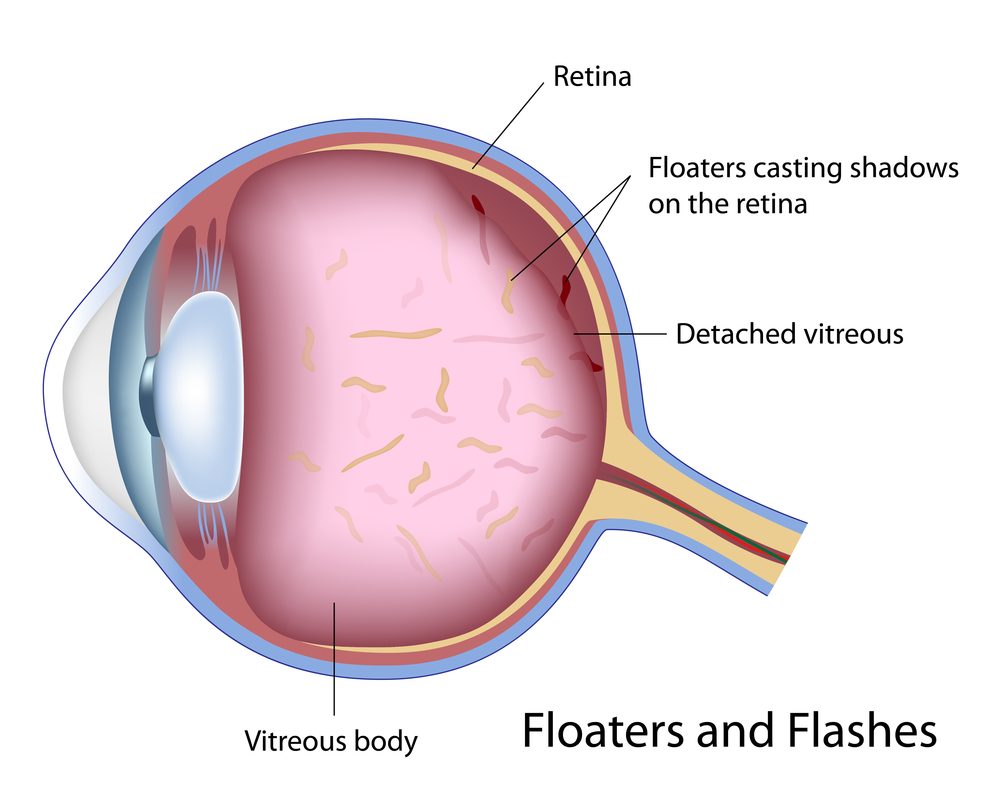
You’re typing at your desk like any normal work day, and you happen to glance away from the screen. As you do, a cluster of grey-ish dots appears out of nowhere, drifting along wherever you turn your gaze. You clean off your glasses and check for eye boogers, but that doesn’t help. It’s like the dots are somehow stuck on your eye. Those annoying shapes are eye floaters, and they can look like black or grey spots, squiggles, or cobweb-like strings.
What causes eye floaters?
Floaters drift around your field of vision and dart away when you try to look at them directly, eventually settling the bottom of your eye and out of your sightline. Floaters appear when the vitreous, the gel-like substance that gives your eye its round shape, shrinks and forms clumps or strands. So what you’re seeing is actually the shadow of those clumps on your retina, not flashing lights in your eyes. Howard R. Krauss, MD, a surgical neuro-ophthalmologist at Providence Saint John’s Health Center in Sant Monica, California, compares eyes with floaters to snow globes. “They are best perceived against a pale, illuminated, non-patterned background, especially the blue sky or a white or off-white surface,” he says.

Are eye floaters dangerous?
Almost everyone experiences eye floaters over their lifetimes, and they’re typically more annoying than dangerous. The people most at risk are those who have diabetes, have had cataract surgery, are very nearsighted, or are over 50, according to Mayo Clinic. In rare cases, floaters can also be a sign of retinal tear or retinal detachment, which could cause you to lose your eyesight permanently. Dr. Krauss says they could also be a sign of hemorrhage, inflammation, or even cancer in the eye. If you see a lot of new floaters or a shadow in your peripheral vision, contact your doctor immediately. Also be wary of any new floaters accompanied by flashing lights which aren’t really present, or by any change in central or peripheral vision, Dr. Krauss says. Work on improving your vision by adopting these daily habits.
How do you get rid of eye floaters?
A study published in JAMA Ophthalmology shows that YAG lasers (the same lasers used for cataract surgeries) may be a viable solution for these floating annoyances that don’t pose major health risks. In a randomized clinical trial, 52 patients either received the laser treatment or a sham one. Of those who received the real treatment, 54 percent saw their floaters decrease over the next six months. Researchers say more studies are necessary before this option becomes available to the public. Find out more things your eye doctor wishes they could tell you.
Another option is a vitrectomy, a surgery that removes the vitreous gel from the back of the eye. “The eye then refills the area with liquid instead of gel strands,” says Benjamin Bert, MD, an ophthalmologist at MemorialCare Orange Coast Medical Center in Fountain Valley, California. However, a vitrectomy carries more risk than cataract surgery, so it’s mostly for severe cases only, Dr. Bert says. There really isn’t a 100 percent risk-free treatment, according to Dr. Krauss. “For mildly annoying floaters, once assured of the health of the eye, it may be best to ignore them as best you may,” he says.
Again, if your floaters aren’t new or obstructing your vision, the best bet is to ignore them. “The brain is very good in trying to suppress the image of the floaters, so if you’re not thinking or focusing on them, they often disappear,” Dr. Bert says. People who are more nearsighted are naturally more likely to have more floaters, but it varies for many people. So, for now, most people learn to disregard them. Don’t disregard your eyesight, and follow these 39 everyday habits that can protect your vision.
How do you ignore eye floaters?
These tips offer temporary relief from eye floaters:
- Move your eyes up and down, or left to right; that can shift the floater.
- Stare as far into the distance as you can, so you’re not looking at them directly.
- Avoid looking at blank white walls or bright lights; that makes them easier to see.
The post If You’re Seeing Eye Floaters or Flashes, Here’s What to Do About Them appeared first on Reader's Digest.
Read More

0 Response to "If You’re Seeing Eye Floaters or Flashes, Here’s What to Do About Them"
Post a Comment